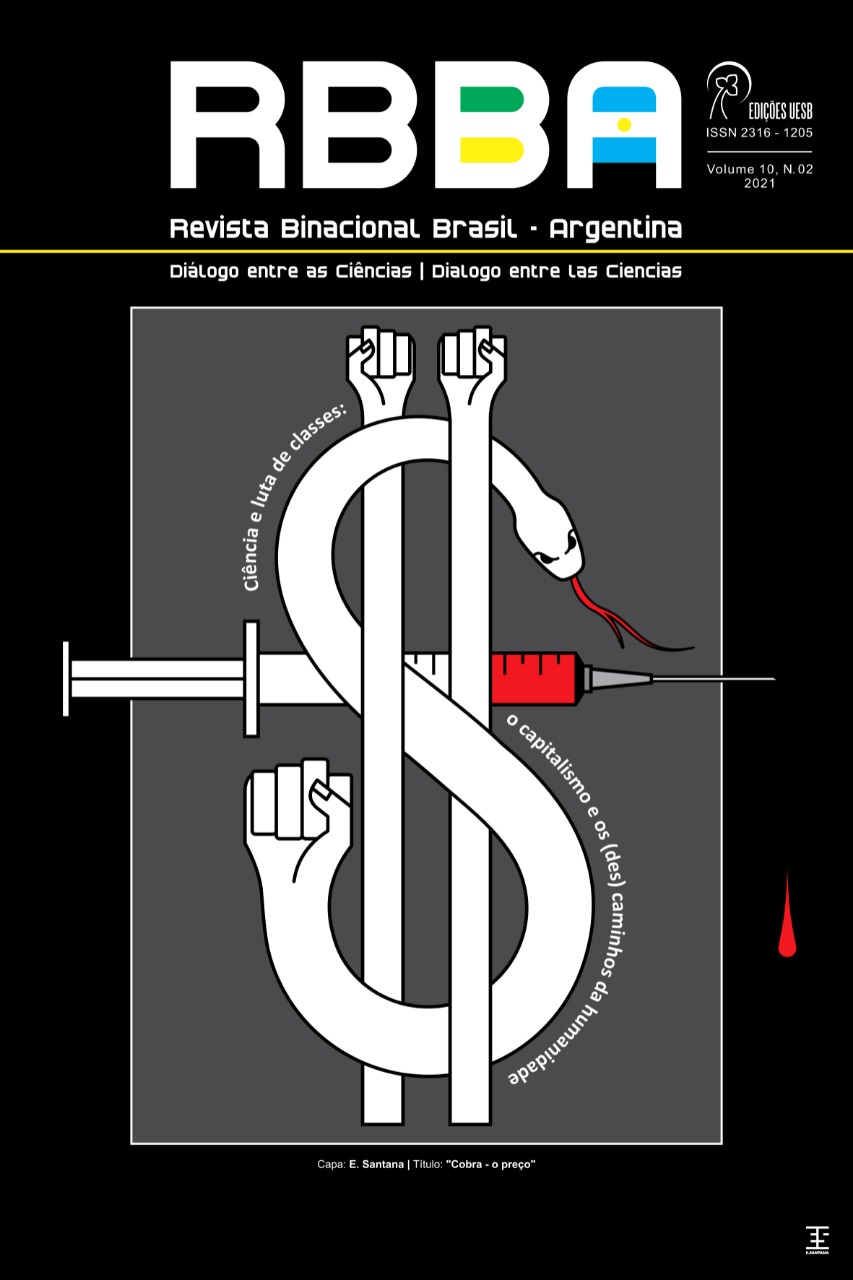CONFIAR EN LA CIENCIA: ¿HAY BUENAS RAZONES PARA DUDAR DE LA EMPRESA CIENTÍFICA EN TIEMPOS ACIAGOS?
DOI:
https://doi.org/10.22481/rbba.v10i02.9593Palavras-chave:
Ciência ocidental, Confiança, Razões, Covid- 19Resumo
O objetivo deste artigo é examinar uma série de argumentos que foram apresentados para apoiar e minar a confiança na ciência. Embora entendamos que a partir desta viagem não é possível responder suficientemente à questão colocada no título, consideramos que é viável fornecer um retrato da situação, aplicando alguns argumentos a favor e contra a robustez do conhecimento científico e a autoridade da ciência para o problema da confiança na empresa científica no contexto da pandemia de Covid-19. Propomos pesar as razões para confiar e desconfiar da ciência e estabelecer alguns critérios para avaliar cautelosamente os argumentos a favor e contra a fé na ciência.
Downloads
Referências
AGAMBEN, G. ZIZEK, S. Et al. Sopa de Wuhan. ASPO, 2020. 185p. Ed. Digital: http://iips.usac.edu.gt/wp-content/uploads/2020/03/Sopa-de-Wuhan-ASPO.pdf
BROWN, J. Smoke and Mirrors: How Science Reflects Reality. New York:
Routledge. 1994. 200 p.
CARTWRIGHT, N. Models and the limits of theory: quantum Hamiltonians
and the BCS models of superconductivity. In: Models as Mediators. MORRISON, M & MORGAN, M. (eds.) New York: Cambridge University Press .1999 pp.241-281
COMTE, A. Discurso sobre el espíritu positivo. Madrid: Alianza. [1844] 1980. 51p.
DANOWSKI, D y VIVEIROS DE CASTRO NUEVA, E. Los miedos y los fines… del mundo. Nueva Sociedad. No. 283 pp 37-48. 2019.
DANOWSKI, D y VIVEIROS DE CASTRO NUEVA, E. Qué escabrosa bestia... Revista de la Universidad de México. México. 2017
DUHEM, P. The Aim and Structure of Physical Theory. New York: Atheneum[1908] 1962. 344p.
FEYERABEND, P. Tratado contra el método. Madrid: Tecnos. [1975] 2007. 337p.
FRANKLIN, A. Física y experimentación. Theoria: An International Journal for Theory, History and Foundations of Science, SEGUNDA EPOCA, Vol. 17, No. 2(44) (Mayo 2002), pp. 221-242
GANGUI, A. El Big Bang. La génesis de nuestra cosmología actual. Buenos Aires: Eudeba, 2010. 391 p.
HACKING, I. Experimentation and Scientific Realism. Philosophical Topics, Vol. 13, No. 1, Realism (Spring 1982), pp. 71-87. University of Arkansas Press
HACKING, I. Representing and Intervening. New York: Cambridge University Press. 1983.287p.
HACKING, I. The Emergence of Probability. Second Edition Cambridge University Press New York. [1975] 2007.215p.
HARAWAY, D. Situated Knowledges: The Science Question in Feminism and the Privilege of Partial Perspective. Feminist Studies. Vol. 14, No. 3 (Autumn, 1988), pp. 575-599
HERRERO, B. ACOSTA, M.et al. Vacunas contra el Covid-19. ¿Bienes públicos o de mercado? Post Note nro. 2. Febrero 2021 Red Argentina de Investigadoras e Investigadores de Salud
INCERTI, G. Anticiencia, el fenómeno fantasma. El universitario. 2020. Ed. Digital: https://eluniversitario.unnoba.edu.ar/2020/11/26/anticiencia-el-fenomeno-fantasma/
KUHN, T. La estructura de las revoluciones científicas. México: FCE. [1962]1985.319p.
LATOUR, B. y WOOLGAR, S. La vida en el laboratorio. La construcción de los hechos científicos. Madrid, Alianza. [1979] 1995.304 p.
LAUDAN, L. A confutation of convergent realism. Philosophy of science, n. 48, v. 1, p. 19–48, 1981.
LLOYD, E. Objectivity and the double standard for feminist epistemologies. Synthese. Volume 104, pp. 351–381 (1995)
LONGINO, H. Can there be a feminist science?, In: Cudd, Ann E.; Andreasen, Robin O., eds., Feminist theory: a philosophical anthology, Oxford, UK Malden, Massachusetts: Blackwell Publishing, pp. 210-217. 2005.
MAFFÍA, D. El vínculo crítico entre género y ciencia. CLEPSYDRA, 5; enero 2006, pp. 37-57. 2006.
MANDAVILLI, A. Los consejos sobre la covid cambian… porque así funciona la ciencia. The New York Times. 2020. Edición digital: https://www.nytimes.com/es/2021/08/24/espanol/consejos-covid.html
Ministerio de Salud de la Nación. Integración de la vigilancia genómica de sars-cov-2 a la vigilancia de covid-19 a través del sistema nacional de vigilancia de la salud versión 1. 04/2021, McLaren, P.J., Fellay, J. HIV-1 and human genetic variation. Nat Rev Genet 22, 645–657 (2021). https://doi.org/10.1038/s41576-021-00378-0
NOLA, R. Y SANKEY, H. Theories of Scientific Method. An Introduction. Stocksfield; Acumen Publishing Limited. 2007.
ORESKES, N y CONWAY, E. Merchants of Doubt: How a Handful of Scientists
Obscured the Truth on Issues from Tobacco Smoke to Global Warming. New York: Bloomsbury Press. 2010. 355p.
ORESKES, N y CONWAY, E. The Collapse of Western Civilization. New York: Columbia University Press.2014. 92p.
ORESKES, N. ¿Why Trust in Science? New Jersey: Princeton University Press. 2019.339p
POINCARÉ, H. Science and hypothesis. Ney Jersey: Science Press, 1905. 208p.
POPPER, K. The Logic of Scientific Discovery. London: Routledge [1935] 2002. 451p.
POPPER, K. Conjectures and Refutations. The Growth of Scientific Knowledge. Londron: Routiedge & Kegan Paul1972. 514p.
PUTNAM, H. Mathematics, matter and method, vol. I. Cambridge: Cambridge University Press. 1975. 360p.
QUINE, W. Two Dogmas of Empiricism. In: From a Logical Point of View. New York: Harper & Row, [1951]1963, pp. 20-46
SANTOS, de Sousa B. Una epistemología del sur: la Reinvención del conocimiento y la emancipación social. México: Siglo XXI. 2009.
SANTOS, de Sousa B. La cruel pedagogía del virus. CLACSO. Ciudad Autónoma de Buenos Aires. 2020.
SVAMPA, M, Cragnolini, M. Et all. La fiebre. ASPO.2020. Ed. digital: https://www.upc.edu.ar/wp-content/uploads/2015/09/La-Fiebre-ASPO.pdf
Downloads
Publicado
Como Citar
Edição
Seção
Licença
Copyright (c) 2021 Revista Binacional Brasil-Argentina: Diálogo entre as ciências

Este trabalho está licenciado sob uma licença Creative Commons Attribution 4.0 International License.












